Declaration of a Planetary Emergency to Begin “the Long Term Reduction of Global Population”
Club of Rome and their mission to create a Scientific Dictatorship to prevent dangerous human activities

All Global Research articles can be read in 51 languages by activating the Translate Website button below the author’s name.
To receive Global Research’s Daily Newsletter (selected articles), click here.
Click the share button above to email/forward this article to your friends and colleagues. Follow us on Instagram and Twitter and subscribe to our Telegram Channel. Feel free to repost and share widely Global Research articles.
First published on October 11, 2023
***
In my last article I wrote about the history and aim of the Club of Rome. I mentioned that they now are one of the leading advocates for declaring a “Planetary Emergency”. This will most likely be the trigger for the setup of a scientific dictatorship.
The idea of declaring an emergency was first proposed to Club of Rome by British consultant and psychotherapist David Wasdell in 2005.
Wasdell, with training from Tavistock Institute, had written a paper called Global Warning that was circulated during the G8 summit in Gleneagles in 2005, with the mission of getting the climate issue higher up on the political agenda.
We have a narrow remaining window to engage global strategic planning and mobilisation, followed by a maximum of fifty years to achieve the transition, to scale down resource usage, to terminate inequitable capital accumulation, and to stabilise and begin the long term reduction of global population.
Wasdell was then invited by the Club of Rome president Prince El Hassan bin Talal to make a speech at their annual conference in Norfolk, Virginia.
In order to achieve the desired impact, Wasdell advised them to:
- Recognise that there now exist a state of global emergency
- Declare excess CO2 to be an eco-toxin [!] with potentially catastrophic impact on the global biosphere
- Develop and operationalize an emergency strategy to move our global society towards a zero or negative carbon economy within the shortest possible timescale
- Develop and operationalize the most effective institutional instruments to manage the transition.
Wasdell, who became an adviser to Al Gore, was also working closely with the Potsdam Institute of Climate Impact Research (PIK) and its director and Club of Rome-member Hans Joachim Schellnhuber to develop the concept of Tipping Points in the climate system.[1]
This concept was incorporated into the Planetary Boundaries framework, which was developed under the leadership of Johan Rockström at the Stockholm Resilience Centre and introduced in the article “A safe operating space for humanity” in 2009. This was done in cooperation with Schellnhuber and PIK.[2]
Planetary Boundaries is a framework to “describe limits to the impacts of human activities on the Earth system”. If left unchecked, it is said to trigger cascading tipping points leading to “large-scale abrupt or irreversible environmental changes”. To prevent this potential scenario, a top-down population control is considered necessary.
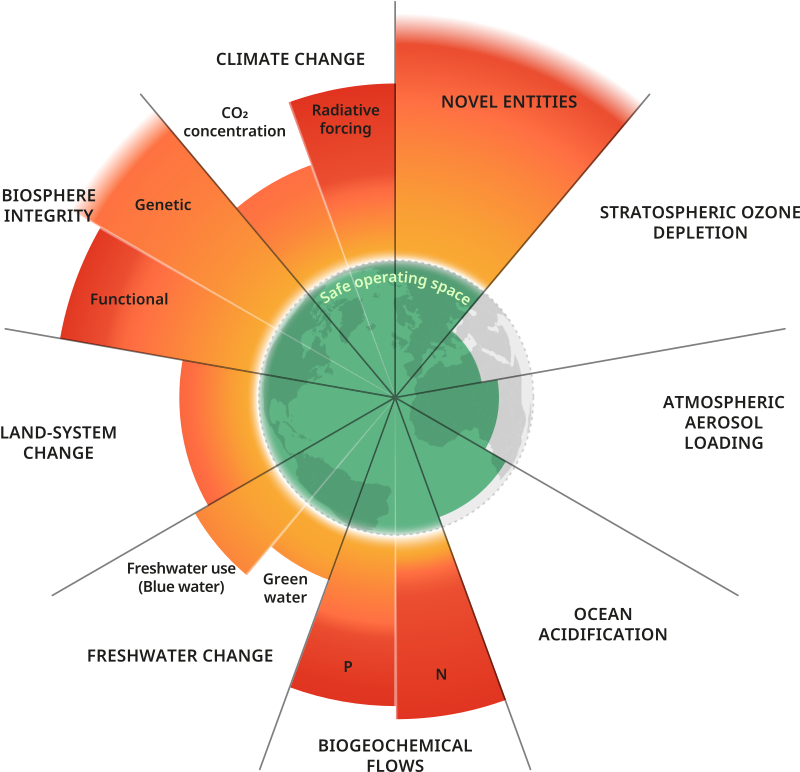
Rockström, a Swedish agronomist, had in 2004 been headhunted by the first IPCC chairman Bert Bolin to serve as director of Stockholm Environment Institute and became the first director of Stockholm Resilience Centre in 2007.
The latter institute, located at Stockholm University, had been set up by the Swedish foundation for strategic environmental research (MISTRA) with the task of developing strategies for sustainable governance and stewardship of ecological and social systems. Rockström later succeeded Hans Joachim Schellnhuber as joint director of PIK in 2018.
The Planetary Boundaries framework was presented by Rockström at Club of Rome’s Global Assembly in Amsterdam in October 2009, with attendance from their royal patron Queen Beatrix of the Netherlands and honorary member Mikhail Gorbachev. Sponsors were Philips, Royal Dutch Shell and KLM.[3]
The framework was included in the Club of Rome-report Bankrupting Nature, authored by Johan Rockström and former Club of Rome-president Anders Wijkman, and became a part of Club of Rome’s and PIK’s The Planetary Emergency Plan in 2019. One year later their Planetary Emergency Partnership was launched with over 300 partners all over the world.
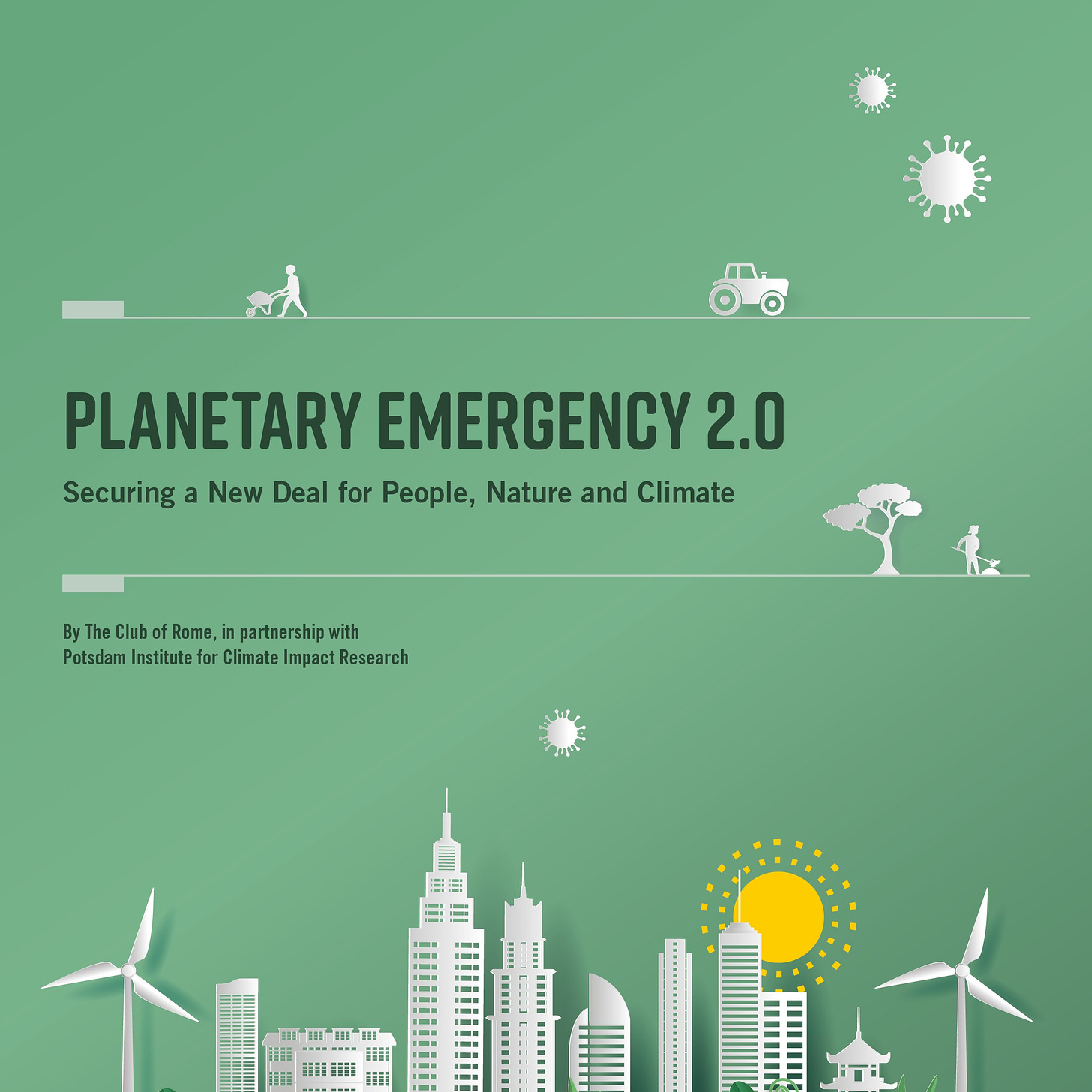
These plans have now come into fruition. A few weeks ago, a statement was made by The Climate Governance Commission at the UN General Assembly High-Level Week & Climate Week.[4]
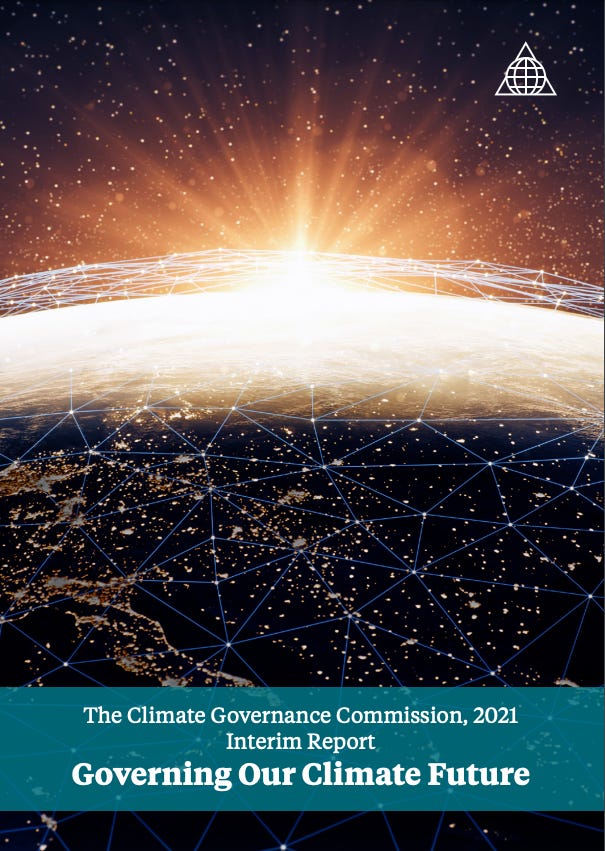
The commission, which includes the current president of the Club of Rome, Sandrine Dixson-Declève, and Johan Rockström, paints a bleak picture of the future – unless we take decisive action.
The world faces a deepening planetary emergency – and is on a reckless path toward catastrophic climate change – having already over-stepped six of nine scientifically-identified planetary boundaries. A continued failure to address the underlying causes of this emergency – such as fossil fuel-based economies, resource waste/overconsumption and the destruction of nature – will have further devastating effects for all of humanity, triggering potentially irreversible tipping points, with dangerous consequences for planetary stability, both social and ecological. A system-wide approach to solving the climate crisis is required now, ensuring reliable climate and planetary boundary governance for the Earth as a whole.
Due to these alleged crises, the commission recommends “bold and concrete steps to catalyze a shift in global governance” in their forthcoming report Governing Our Planetary Emergency, which will be released in conjunction with the climate summit in Dubai (COP28) in November 2023.
The Climate Governance Commission was founded by the Swedish Global Challenges Foundation at the UN75 Global Governance Forum, September 16 & 17 2020, and is led by former Irish President Mary Robinson from The Elders and Club of Madrid with Johan Rockström and the former President of the UN General Assembly María Fernanda Espinosa as co-chairs. Supporters include Club of Madrid, Stimson Center and The Rockefeller Foundation.
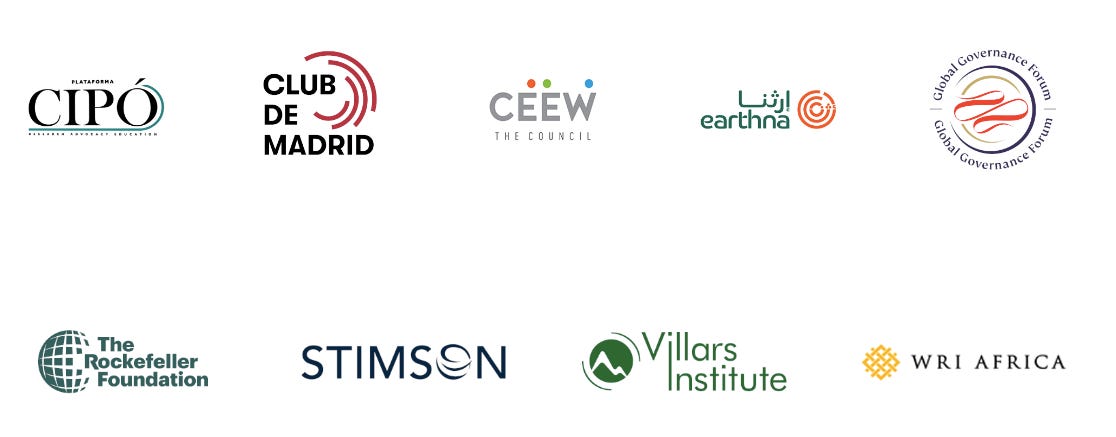
The former president of Club of Rome that intervened trying to prevent my dissertation from being approved is a “contributing expert”.
They CGC state that the “global governance system is ill-equipped to deal with our planetary emergency, which now encompasses the “polycrisis” including, for example, international conflict, financial instability, global inequality, and pandemic risk and recovery.” The new term “polycrisis” was frequently used in discussions at the World Economic Forum in Davos in January 2023.[5]
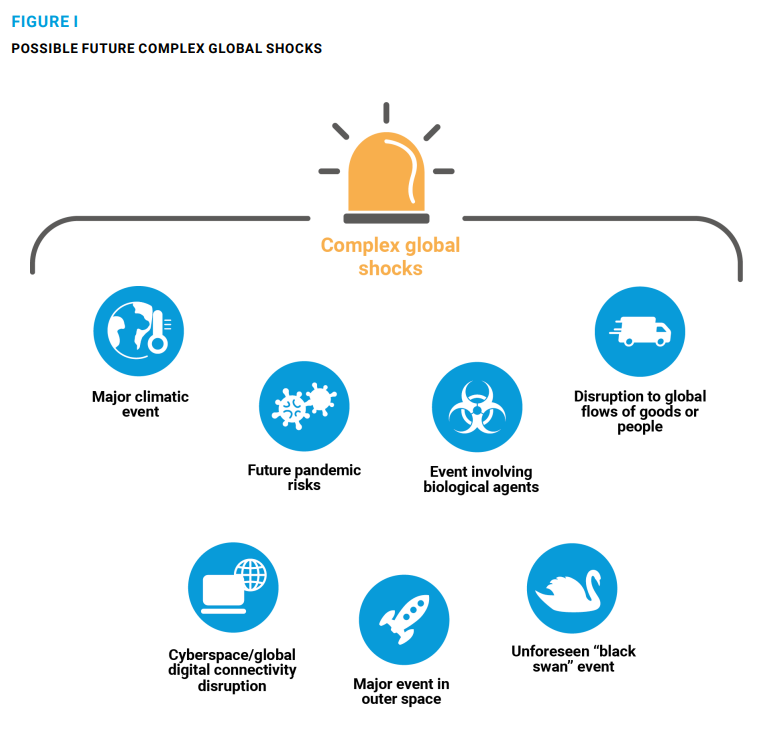
To handle this “polycrisis”, CGC calls for “competent” crisis leadership.
Empowered with new authorities, current and new international governance institutions must exert competent crisis leadership, developing and deploying emergency plans and a new generation of effective policies while pursuing a more equitable allocation of resources. Further, scientific boundaries are not negotiable, but must drive and fundamentally inform our collective action and management systems.
To set these “new authorities and capabilities” in motion the commission proposes that the UN General Assembly declares a planetary emergency at the Summit of the Future in September 22-23 next year.
The UN General Assembly should declare a global planetary emergency at the 2024 Summit of the Future, reinforced in similar statements by UN Agencies, regional bodies, and national and local governments.
The commission then suggests to elaborate on the UN Secretary-General’s proposed Emergency Platform “to design and convene an inter-agency, intergovernmental Planetary Emergency Platform to bring together fragmented international institutional structures, and to develop a Planetary Emergency Plan for urgent, coordinated action, with linked national emergency plans.”
I describe the Emergency Platform here.
This Platform, consisting of intergovernmental, State and non-State actors, would “plan for and cooperate on urgent action at all levels of governance, including a global decarbonizing package”.
The commission point out that over-stepping the planetary boundaries has to come with consequences.
Global security norms should be broadened to reflect the grave implications of over-stepping climate/planetary boundaries, including UN Security Council practices to better reflect the climate policy challenges and priorities of the Global South and of all peoples.
They are because of this calling for “courageous “top down” leadership within all levels of government, combined with generalized “bottom up” citizen pressure and engagement, to catalyze fundamental transformations.”
Some of the other suggestions in the statement includes:
- A Global Environment Agency
- An International Court for the Environment
- Institutional Reform of the Global Financial System
Rockefeller Philanthropy Advisors Global Commons Alliance
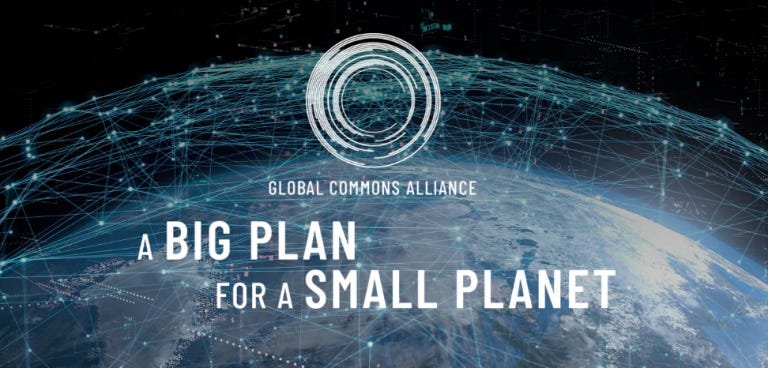
In the background, another closely related initiative has been developed to execute the prescribed transformation. In 2019 the Global Commons Alliance was launched in Singapore by Rockefeller Philanthropy Advisors with the mission “to mobilize citizens, companies, cities and countries to accelerate systems change, and become better guardians of the global commons”.[6]
Their strategic priorities are to change minds, actions and systems in order to safeguard the global commons and “regaining planetary stability”. They are ready to act swiftly when an emergency is declared.
By 2025, the true magnitude of the multifaceted transformations we need to safeguard the global commons will be well understood. Key actors will know what they need to do, where things are most urgent, and be taking action that sparks and sustains transformational change in order to protect the global commons.
Their philosophy is all based on Rockström’s Planetary Boundaries Framework.
The 70+ partners include Club of Rome, PIK, WEF, and WRI, with support from an “Investor Collaborative” consisting of among others Swiss MAVA Foundation, Dutch foundation Porticus and United Nations Global Environment Facility.
Rockström is a member of the steering committee of the Global Commons Alliance and leads the “Alliance Component” The Earth Commission with the mission to define “safe and just boundaries for people and the planet”.
This is a graph from my book The Digital World Brain (under translation to English), illustrating their formula for “systems transformation”.
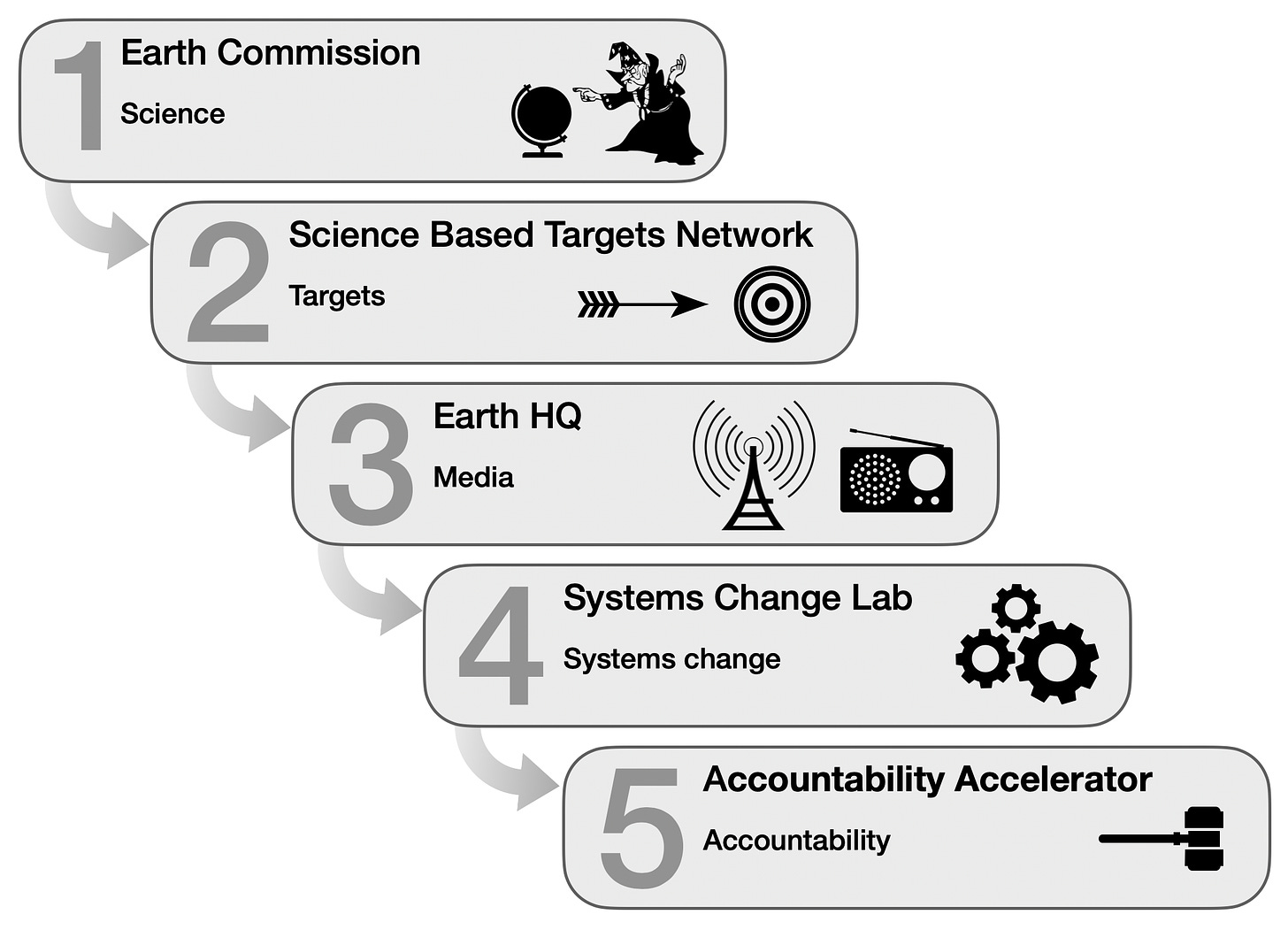
It is a recipe for a Scientific Dictatorship. To quote the “tenth commandment” on the now demolished Georgia Guidestones:
Be not a cancer on the Earth – Leave room for nature – Leave room for nature.
It also reminds me of a document from the Secretariat of World Order that George Hunt uncovered during a “UNA Environment and Development Conference to provide broad public debate and support for United Nations Earth Summit” in Des Moines, September 22 1991.[7]
The security council of the UN, led by the Anglo-Saxon Major Nation Powers, will decree that henceforth, the Security Council will inform all nations that its suffrance on population has ended, that all nations have quotas for REDUCTION on a yearly basis, which will be enforced by the Security Council’ by selective or total embargo of credit, items of trade including food and medicine, or by military force, when required.
This has now been rebranded as carbon footprint reduction.
I will delve more into the Global Commons Alliance in a coming article. I also mention their influence in my presentation “Shaping the Future Agenda – The Digital World Brain” from Stavanger.
*
Note to readers: Please click the share button above. Follow us on Instagram and Twitter and subscribe to our Telegram Channel. Feel free to repost and share widely Global Research articles.
Notes
[1] www.apollo-gaia.org/A-GProjectDevelopment.pdf
[2] Rockström, J., Steffen, W., Noone, K. et al. A safe operating space for humanity. Nature 461, 472–475 (2009). https://doi.org/10.1038/461472a
[3] www.slideshare.net/Eurotopia/assembly-programme
[4] globalgovernanceforum.org/wp-content/uploads/2023/09/Governing-our-Planetary-Emergency-CGC-Statement-UNGA-v2.pdf
[5] www.weforum.org/agenda/2023/01/polycrisis-global-risks-report-cost-of-living/
[6] globalcommonsalliance.org/about/
[7] archive.org/details/GeorgeHuntUncedEarthSummit1992cobdenClubsPapersaldousHuxleythe_125/2-1-unUncedEarthSummit1992ByGeorgeHunt..mp4
Featured image is from SHTFplan.com

